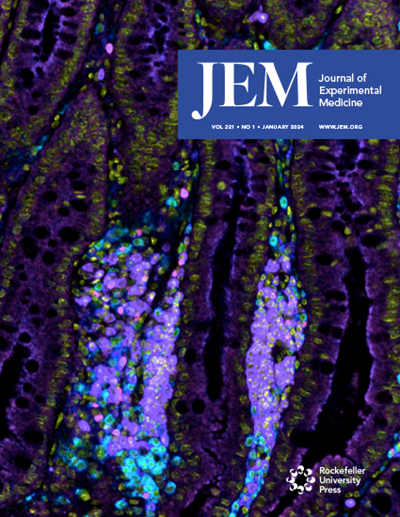嗜碱性粒细胞:肺部炎症的时空调节器
IF 12.6
1区 医学
Q1 IMMUNOLOGY
Journal of Experimental Medicine
Pub Date : 2024-12-02
Epub Date: 2024-10-25
DOI:10.1084/jem.20241663
引用次数: 0
摘要
在本期《微生物学报》上,Schuijs 等人(https://doi.org/10.1084/jem.20240103)强调了嗜碱性粒细胞在对屋尘螨(HDM)的过敏性免疫反应中的新作用。他们发现,白细胞介素-33(IL-33)激活的嗜碱性粒细胞通过与肺内皮细胞的相互作用,在特定的时间框架内促进Th2细胞的招募和外渗进入肺部。本文章由计算机程序翻译,如有差异,请以英文原文为准。
Basophils: Regulators of lung inflammation over space and time.
In this issue of JEM, Schuijs et al. (https://doi.org/10.1084/jem.20240103) highlight a novel role for basophils during allergic immune responses to house dust mites (HDM). They reveal that interleukin-33 (IL-33)-activated basophils facilitate the recruitment and extravasation of Th2 cells into the lungs during a specific time frame via their interactions with pulmonary endothelial cells.
求助全文
通过发布文献求助,成功后即可免费获取论文全文。
去求助
来源期刊
CiteScore
26.60
自引率
1.30%
发文量
189
审稿时长
3-8 weeks
期刊介绍:
Since its establishment in 1896, the Journal of Experimental Medicine (JEM) has steadfastly pursued the publication of enduring and exceptional studies in medical biology. In an era where numerous publishing groups are introducing specialized journals, we recognize the importance of offering a distinguished platform for studies that seamlessly integrate various disciplines within the pathogenesis field.
Our unique editorial system, driven by a commitment to exceptional author service, involves two collaborative groups of editors: professional editors with robust scientific backgrounds and full-time practicing scientists. Each paper undergoes evaluation by at least one editor from both groups before external review. Weekly editorial meetings facilitate comprehensive discussions on papers, incorporating external referee comments, and ensure swift decisions without unnecessary demands for extensive revisions.
Encompassing human studies and diverse in vivo experimental models of human disease, our focus within medical biology spans genetics, inflammation, immunity, infectious disease, cancer, vascular biology, metabolic disorders, neuroscience, and stem cell biology. We eagerly welcome reports ranging from atomic-level analyses to clinical interventions that unveil new mechanistic insights.

 求助内容:
求助内容: 应助结果提醒方式:
应助结果提醒方式:


